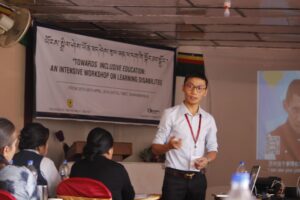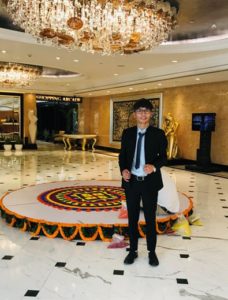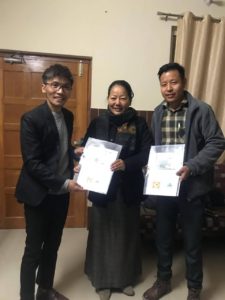As I sit opposite Nyima, Special Education Consultant at the Tibetan Ability Center (TAC), it strikes me that the answer is a resounding no.
Nyima was born in the Amdo Ngawa region of Tibet to a nomadic family, one of nine siblings. He herded yaks in the spring and summer: in the autumn and winter he went to school :but this was not a positive experience. On occasion his parents faced difficulties in paying school fees,and , to his mortification, his class teacher read his name out in front of all his classmates.
His uncle arrived from India, speaking enthusiastically about all the opportunities to be had there. Nyima’s parents decided to send Nyima to India with his uncle.
The trip to Lhasa was uneventful, but from there they had to resort to subterfuge, as Nyima did not have the required documents. He was put into a box in the back of the car and told not to respond even if the box were moved or kicked. Every detail was thought through, such as the timing of their arrival at the Dam outpost at the time that the Chinese guards were at their least alert.
From there the party set out on foot for the seven day trek to Nepal. Almost immediately they lost one guide. This became problematic for several reasons, not least because he was responsible for their food.
The party divided into two and Nyima was in the first party which reached Nepal without incident. Unfortunately the Chinese caught the second party. This caused Nyima and his uncle much grief as they lost a close relative.
In India, he was sent to the Tibetan Children’s Village school at Gopalpur. Here again school started unhappily as his schoolmates laughed at his Amdo dialect. He soon learned to speak the Central dialect and worked hard in school. He was at a disadvantage, however, as he wrote more slowly than his peers, and so he was regarded as being less capable.
2008 was a watershed year for him. He started questioning himself, ‘Who am I? Where am I from? Why am I in exile?’He did not get final answers, but he was certain that the Tibetan language was the only tool to define him.He took part in founding the Tibetan Language Preservation Club at his school campus. With the support of students and teachers he and his team invited many intellectual figures from outside to the school. He was an energetic organiser, and so he grew in the understanding that (in his words) “I can do something for Tibet.”
His teachers were concerned about his academic progress, and advised him to spend more time on his studies, but he only became even more determined. It turned out that his involvement in the Club did not harm his school marks because in 2015 he graduated second in his school.
Nyima was inspired by his experiences as a struggling learner to Google the term “Learning Disabilities.” This motivated him to successfully apply for a scholarship at Amity University. On graduation with a degree specialising in Special Education he went to work for the Tibetan Ability Centre in Dharamshala. He has been there for almost a year now, and is a champion for the cause of Inclusive Education. He advises principals, teachers and parents on issues such as how to manage hyperactive and Attention Deficit Disorder (ADD) children. He plans to further his studies in the field of autism.
A key concern that he has is that the field of Inclusive Education is heavily based on Western practice: it needs to be examined in the context of Tibetan education. He has put much thought into this, and has several theories that he is putting into practice.
For now, Nyima is focused on paying back the investment that the community has made in him by making a contribution to Tibetan society. He has made sacrifices to this end. Still, he believes that from a professional point of view, experience is worth far more than short term financial considerations.
What does the future hold for Nyima? Only time will tell. One thing is certain though: he has much to give to the Tibetan community he loves.







 Print
Print Email
Email













